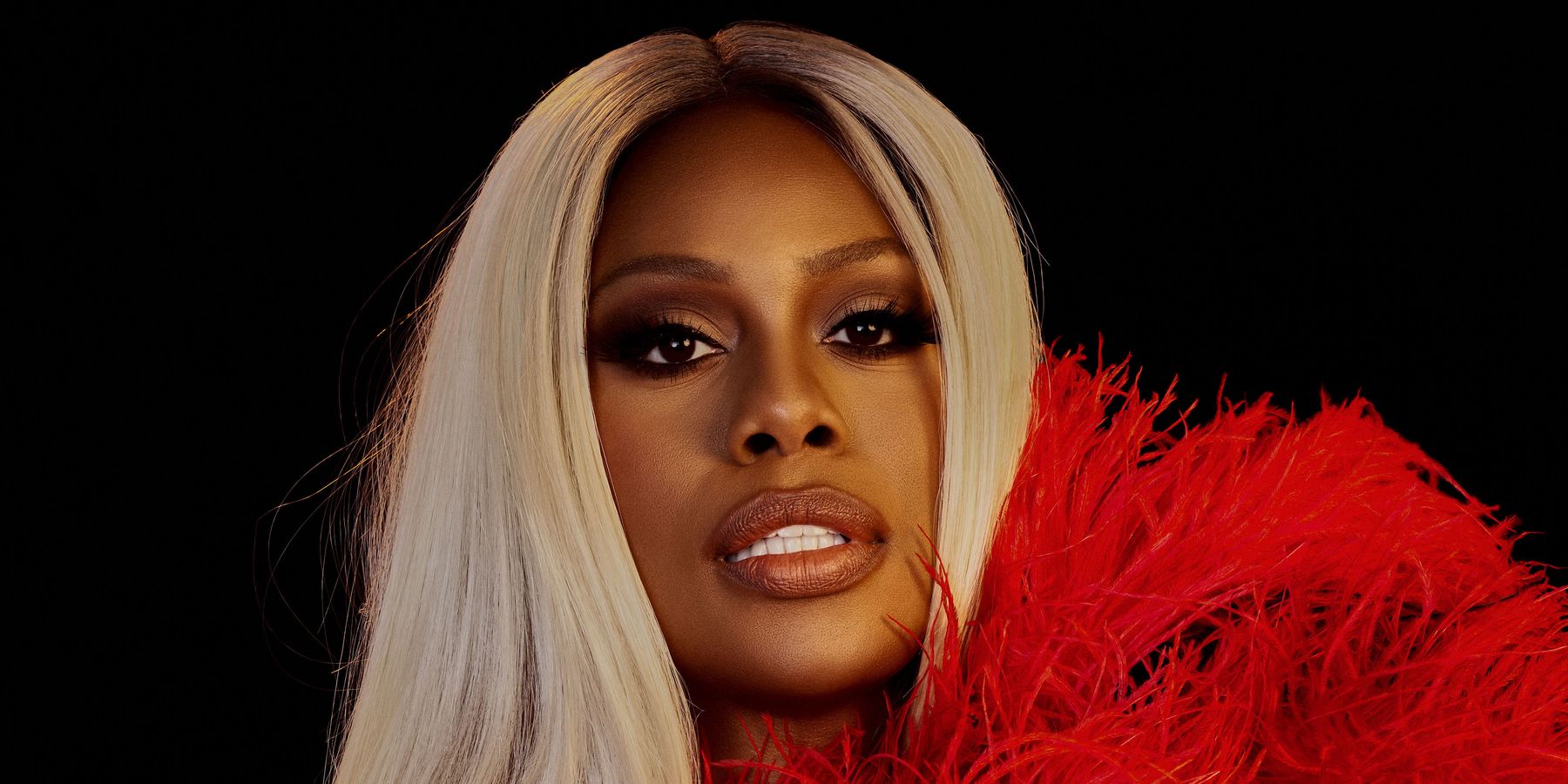
America Only Has One Laverne Cox
Story by Bianca Gracie / Photography by Joshua Kissi / Styling by Alexander-Julian / Hair by Ursula Stephen / Makeup by Mario DedivanovicOct 26, 2020

This article is a sponsored collaboration between Hulu and PAPER
Laverne Cox is tired. Not so much in the physical sense; she glows radiantly during a Zoom call from the Los Angeles apartment where she's quarantining. It cuts deeper than that. 2020 has taken everyone on a grim rollercoaster ride of emotions, and Cox is feeling it.
The ongoing pandemic has exposed the nation's darkest tendencies, from racial injustice to increasing violence against the trans community. So as a proud Black trans woman, the actress feels the tension tenfold. Since her career breakout as Sophia Burset on Netflix's Orange Is the New Black (a role she held from 2013 to the series' end last July), Cox's name has become synonymous with "first." The first openly trans actor nominated for a Primetime Emmy for Orange Is the New Black, television's first trans series regular in CBS' Doubt drama, the first trans person to grace the covers of Time and Cosmopolitan, the first trans person to receive a Madame Tussauds wax figure... the list is impressively endless.
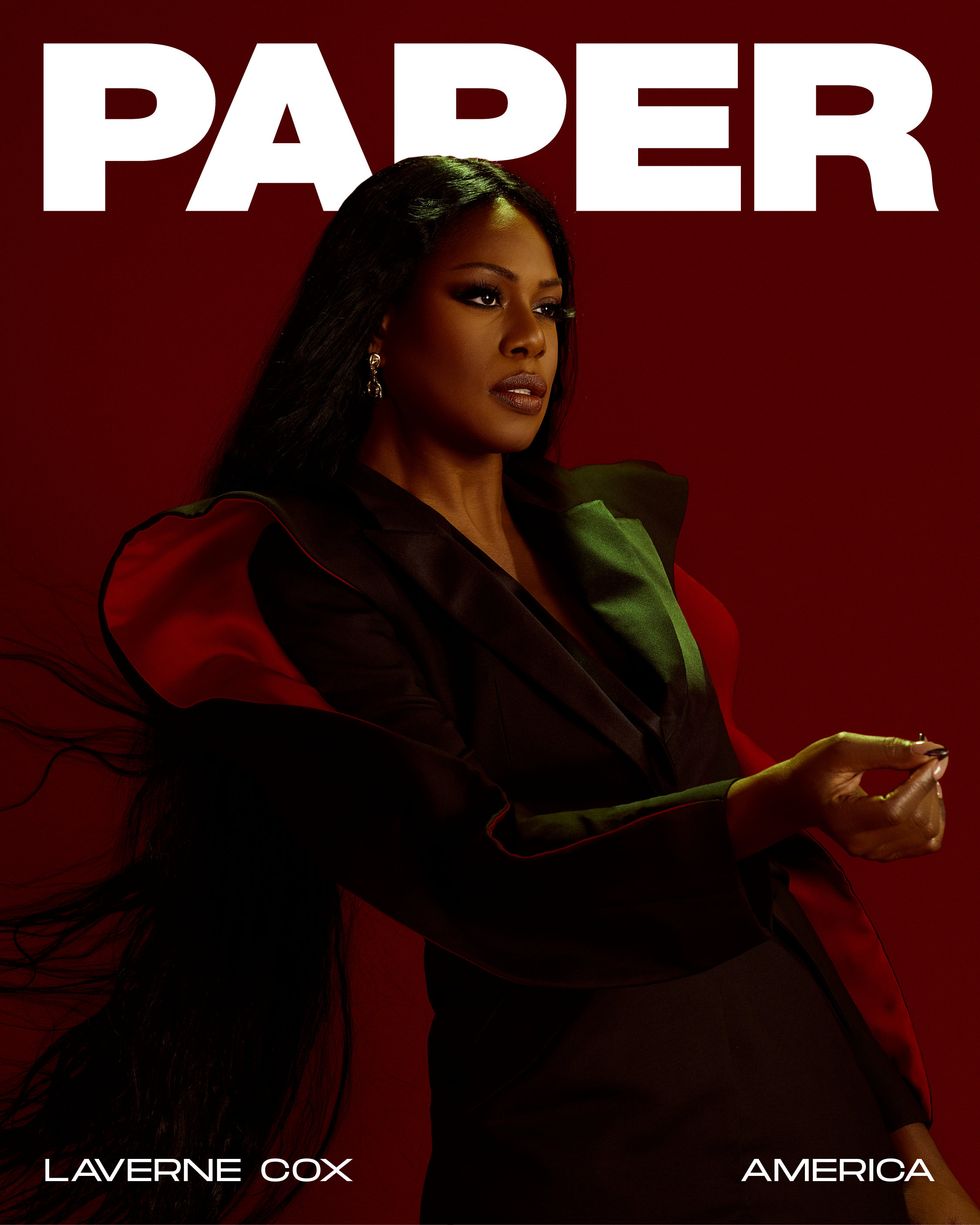
Dress: Alexander McQueen, Tights: Calzedonia, Earrings: L'Enchanteur
Cox's accomplishments have shattered boundaries for both herself and the trans community. But they do come with a hefty dose of responsibility to always be present. She is human, after all, and is allowed to crack once in a while. The pandemic has given Cox the grace she didn't realize she needed. Now, she's slowing down.
"I've learned that I have to really listen to my body. Like literally, I've gotten email requests for me to do something and I feel my body tense up," Cox says. "I justified it by saying, 'Well, this is for a good cause' and then my body's just tense for the whole thing."
Tears well in Cox's eyes as she recalls gulping down these tough lessons. But she soon catches her breath and throws back a hearty laugh while discussing the overflow of "no" responses in her email inbox. "There is a lot of responsibility that I felt as a citizen of the world and a person with a platform," she explains. "But my body has been stressed out and depleted for a really long time. I've been pushing past it for success and to be of service for so many reasons. You get to a point when the body just can't keep doing that. It's not sustainable. Girl, it has really done a number on me this year."
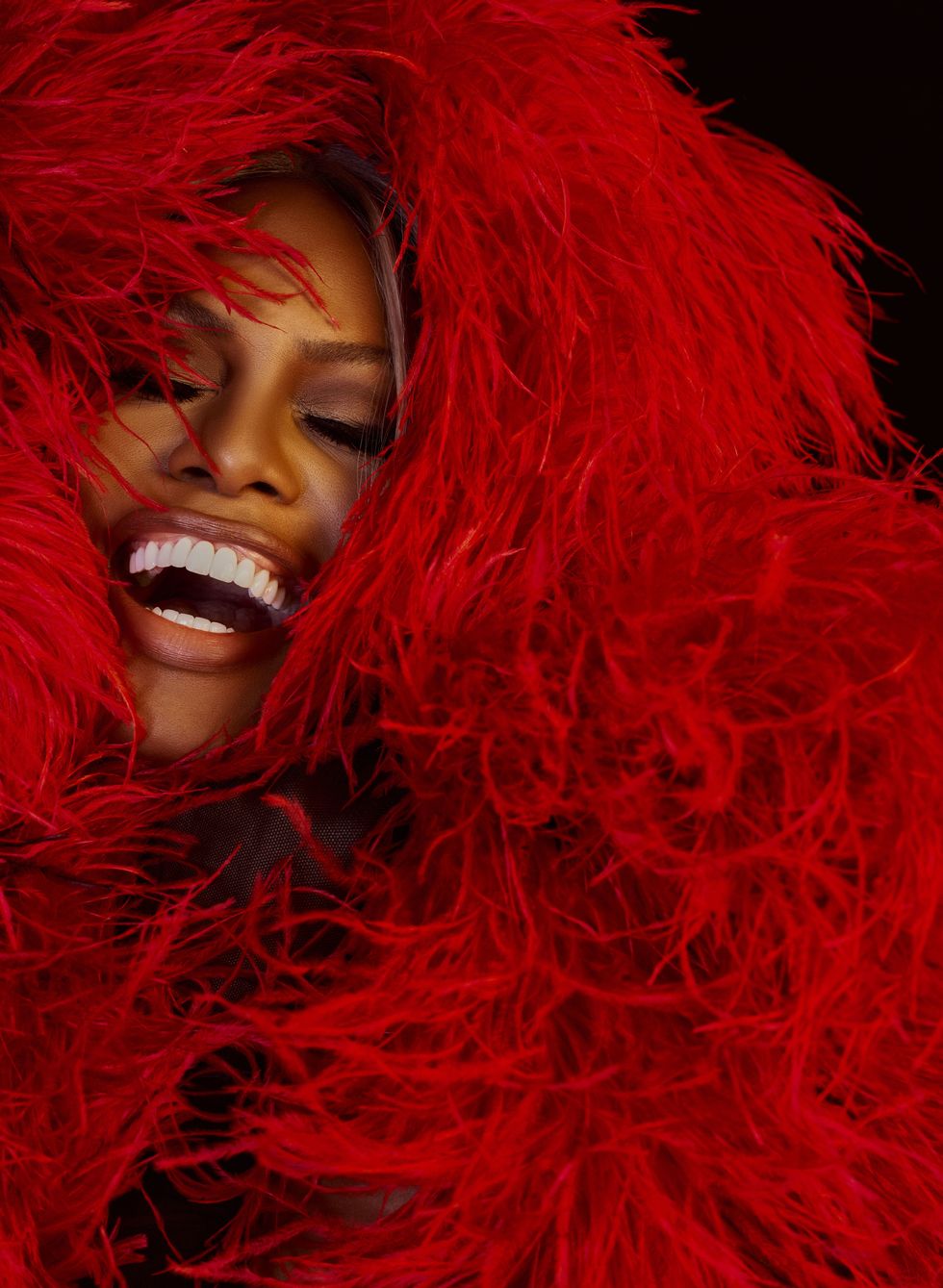
Coat: Disney Villains x The Blonds, Dress: Area
Now, Cox has more room to indulge in things that excite her — like fully diving into her hobby of singing arias (she received a friend's dance remix of her version of Porgy and Bess' "Summertime" just before our chat). But along with the actress' rejuvenated enthusiasm, she's also reminded of her resilience. As a dual-minority in a white-facing capitalist society, it unfortunately comes with the territory.
While there is growing support for trans people, the murder rate is simultaneously increasing. Cox has the harrowing statistic at the ready. "As of today, 32 transgender people that we know of have been murdered in 2020. That is a record number," she says incredulously. "People are still out on the streets getting murdered? What the hell is going on?"
Related | Hood By Air Flips the Flag
Cox continues: "I've been talking about violence against trans people for my entire public life. And I'm tired of it. I would love to just not have to talk about it anymore, but it's unfortunately still going on. In Disclosure: Trans Lives on Screen [the Netflix documentary executively produced by the actress], we have unprecedented visibility for trans people. But we're targeted more. How do we keep us alive? What I know from my work with the NYC Anti-Violence Project is that we reduce violence against trans people with access to housing, employment and healthcare."

Dress: Christopher John Rogers, Gloves: Wing + Weft, Rings: L'Enchanteur
A front-facing advocate like Cox must be fiercely resilient. America is built on white supremacy. Trying to keep up with societal rules has even seeped into what Black people are supposed to look like. It was only in September that the US House of Representatives passed The CROWN Act (which stands for "Create a Respectful and Open World for Natural Hair"). The bill legally prohibits discrimination based on a Black person's hairstyle or texture nationwide.
For many Black people, especially women, being forced to assimilate to Westernized beauty standards is just like living in a horror film. Cox, who is honest about her own hair struggles, knows this first hand. Coincidentally enough, the actress — along with a troop of A-list peers — is unpacking these traumas on screen.
On October 23, Hulu exclusively released Bad Hair, a horror satire directed by Dear White People's Justin Simien. Set in 1989, it revolves around Anna Bludso (played by Insecure and Dear White People's Elle Lorraine) who trades in her natural hair for a weave in order to climb up the corporate ladder, which results in near-demonic possession. The film also stars Jay Pharoah, Lena Waithe, Kelly Rowland, Usher, Blair Underwood and Vanessa Williams.
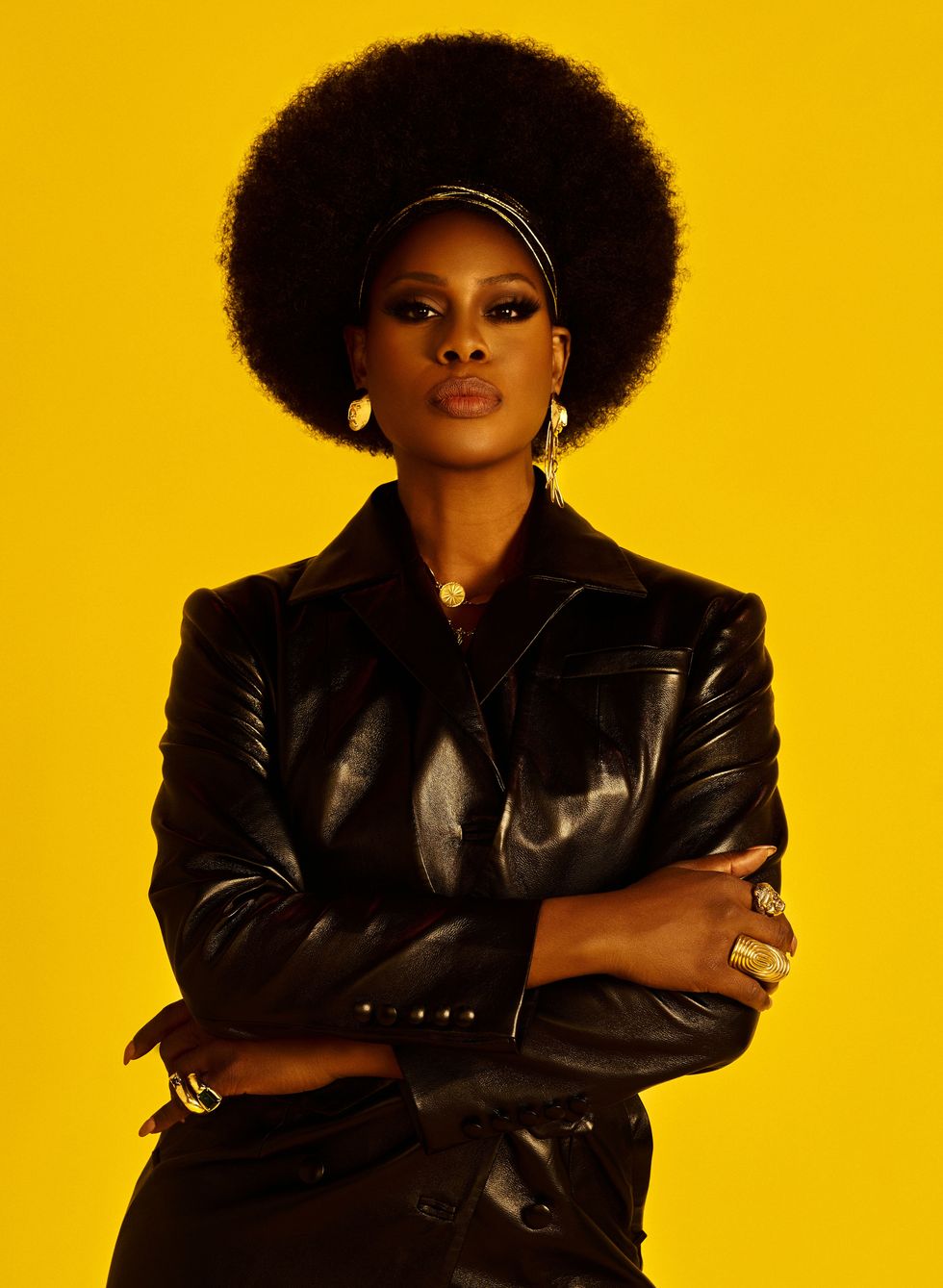
Rings: Johnny Nelson and L'Enchanteur, Necklace: Ale Bremer
Bad Hair entered development in 2015, after producer Julia Lebedev viewed Japanese horror films like The Wig and Exte, and Simien used those B-movie horror tropes as a platform to unpack the traumas that come with having Black hair. "Even if you're talking about The Grudge or The Ring, wet hair is a constant horror motif [in Japanese films]," he tells PAPER. "I've loved horror movies from a very young age and I couldn't stop thinking about it. I was like, 'I never see Black people in movies like this.'"
In Bad Hair, Cox plays Virgie, a hairstylist integral in Anna's transformation. But unlike her role as Orange Is the New Black's Sophia, whose hair salon was a safe space for the women prisoners, Virgie has a mysterious persona that isn't to be trusted.
"I was creating her from my own personal history and my imagination, which was such a thrilling process. I could've gone really big and played up the witchy, horror piece of it, but Justin didn't want that at all," Cox explains. "He was just like, 'Just comfort and soothe her.'"
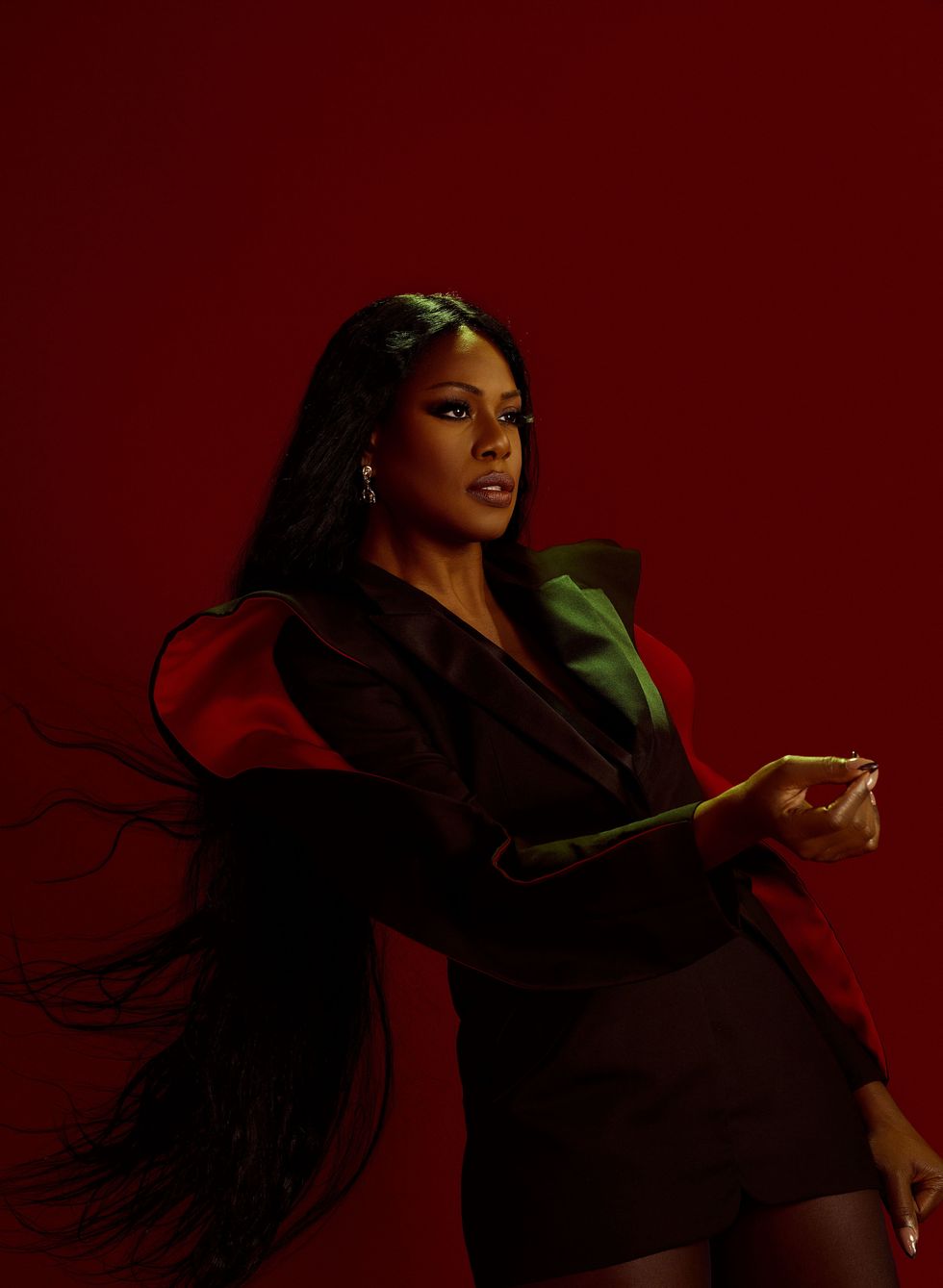
Dress: Alexander McQueen, Tights: Calzedonia, Earrings: L'Enchanteur
Admiringly calling her a "light bulb with legs," Simien states that he's always wanted to work with Cox but didn't want to intentionally cast her as a trans character. Along with casually singing between takes, the actress also shared her complicated hair history with the director, which helped drive the storyline.
When Cox read the script's opening scene (which finds the main character suffering a painful and all-too-familiar burn from a perm that sat too long on her scalp), she immediately started bawling. It's an experience that resonates with Black women worldwide, beginning from a young age.
"I've thought a lot about my own aesthetic choices over the years," Cox begins, knowingly pointing out her signature honeyed lace wig that cascades over her shoulders. "I did a talk with bell hooks several years ago and we [discussed] a lot of trans women embracing high femme aesthetics. A lot of that's really about survival, right? Our lives are in danger often as trans folks. It would be great if [our hair] was just a choice divorced from some political reality."
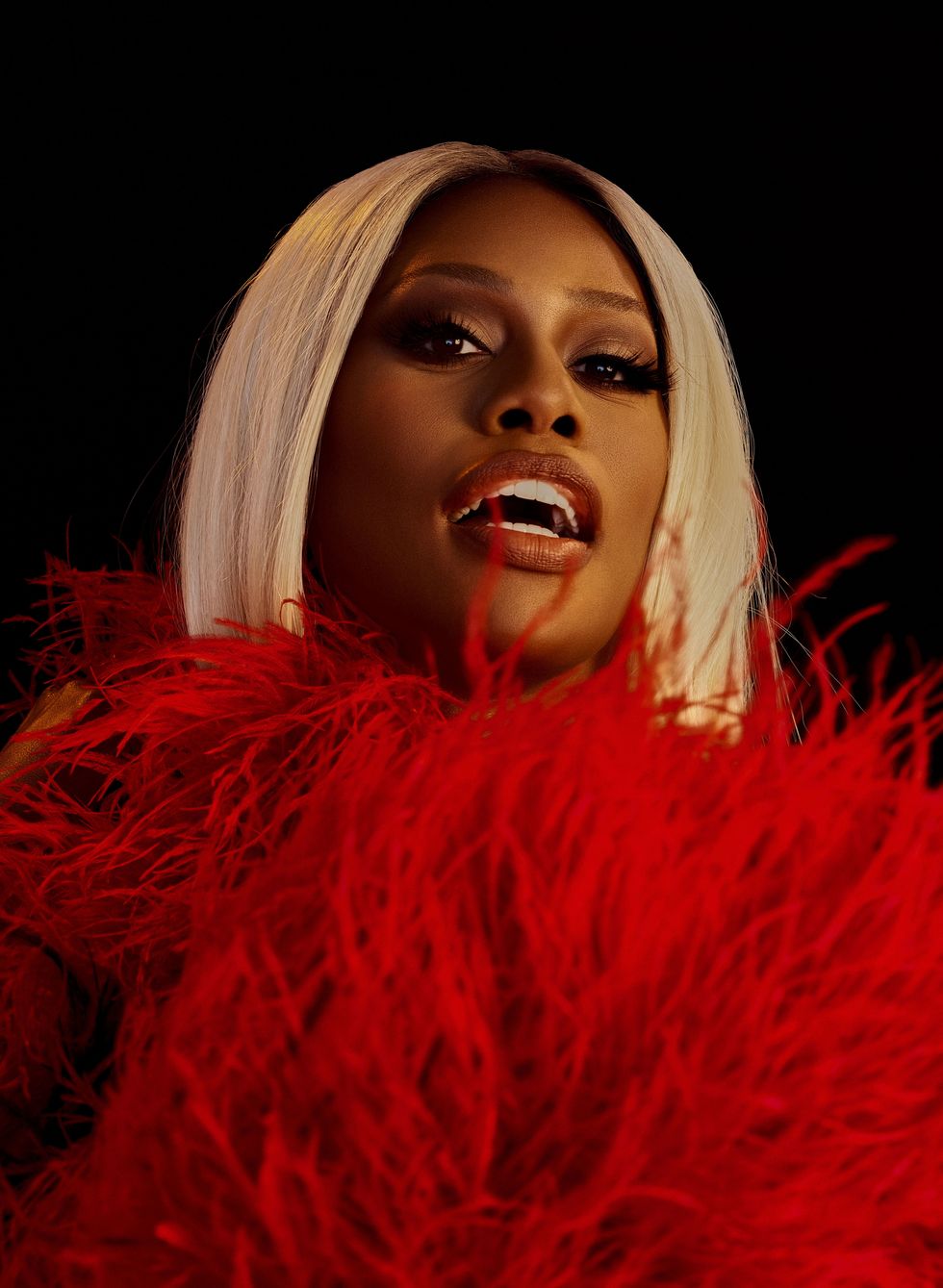
Coat: Disney Villains x The Blonds, Dress: Area
Underneath Cox's wigs lies decades of experimentation. Prior to her transition, she had a shaved head as a kid. Once she headed to college, she kept the sides shaved and grew out the top to sport box braids with African-inspired topknots ("I did black lipstick and had no eyebrows," she says with a laugh, "it was a look.") In the early '00s, she left bleach to soak in her hair a little too long and it started coming out in the sink. In 2011, Cox threw out relaxers and began embracing her 4C curl pattern, which she keeps moisturized with coconut oil in cornrows.
But while she adores her "lovely nappiness," Cox sometimes sees her lace wigs as armor. "I'm a trans woman who is femme, but I'm tall and have broad shoulders. It's a question of safety," she explains. "When I go into the SHU [Security Housing Unit] in Orange Is the New Black, I have my own natural hair. It was beautiful to be able to act as Sophia like that. But why is it so vulnerable for me to have my own hair? Am I still sexy? In consumer capitalism for women, being desirable is linked to being marketable and being hirable. If you're an actress, they really are linked."
There is a jarring scene in Bad Hair where Virgie (Cox) gives Anna (Lorraine) a sew-in where the needle literally digs into her bloody scalp while Anna grits through her teeth: "I'm fine." It's a typical hair salon experience that turns nearly Saw-level gory that is quite traumatizing to watch. There's an underlying symbolism: Black women have far too long swallowed their pain without speaking up.
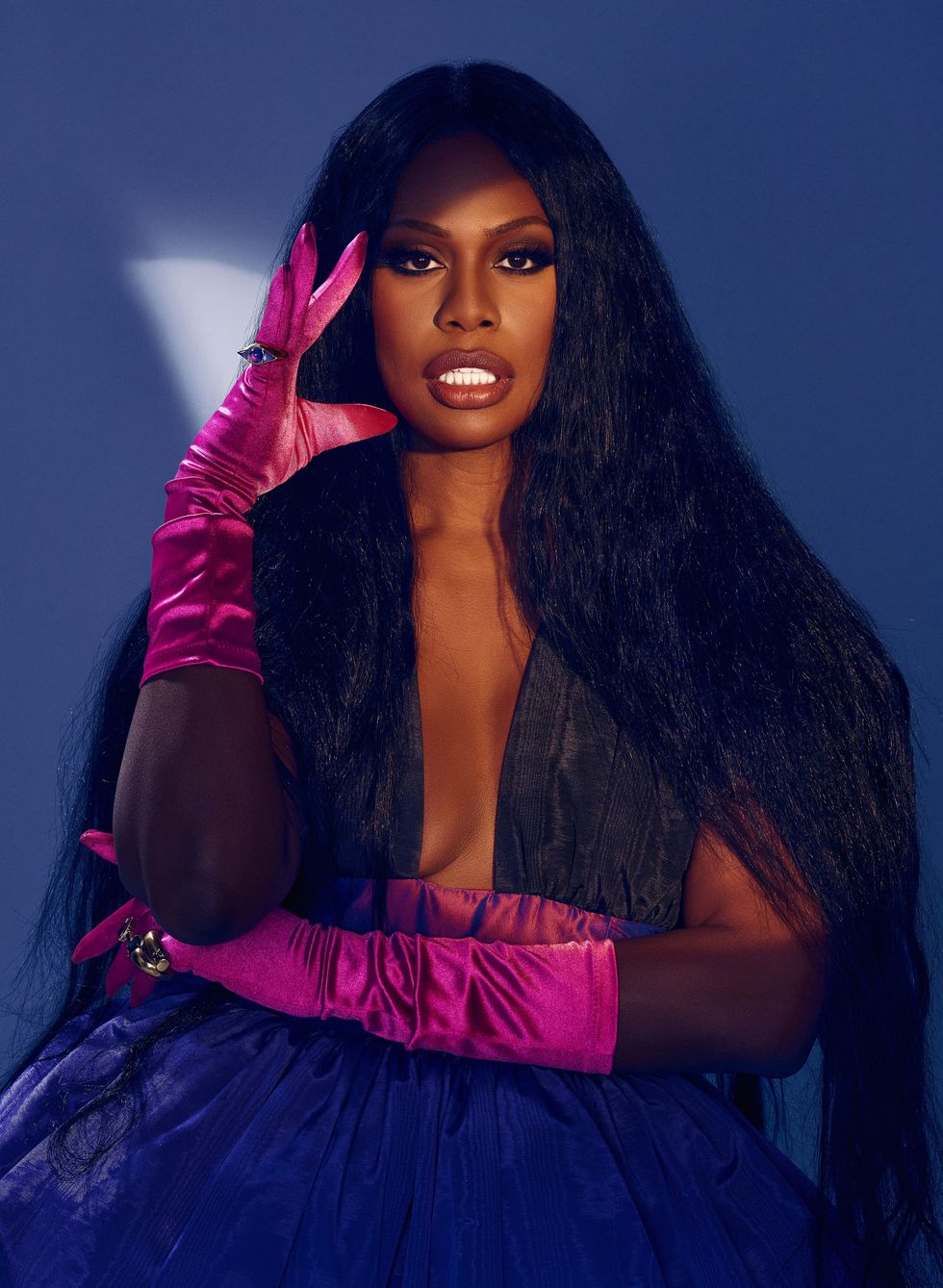
Dress: Christopher John Rogers, Gloves: Wing + Weft, Rings: L'Enchanteur
Many were taught that beauty is pain. "We've had our edges yanked for weaves and extensions for a really, really long time. I used to do these microbraids back in the early '00s," Cox recalls. "My butt would go numb and I took the pillow up to an African braiding salon in Harlem. I would sit for 12 to 16 hours sometimes getting these braids done," she says while showing me a photo of "Say My Name"-era Beyoncé-inspired hair. "I think this film is an opportunity, if we choose to accept it, to exorcise the demons of white supremacy and these restrictive beauty standards and let go."
It was Simien's aim to highlight the "shitty deal" that is often handed to Black women. "We depend on them for so much of our culture, for our slang, for our style, for our language," he states. "We always depend on them to be strong and to vote and to take care of the kids and all this stuff. Yet, they're being given these choices that really are about just exploiting them."
Simien continues: "All the hair and special effects are the icing, but the cake is about the fact that we have to give up so much in order to participate in this thing called capitalism. No one talks about the scars that are just below the surface. I felt like it would be cathartic, maybe a little traumatic, but necessary to give some space in my cinema to admit this shit hurts."

Rings: Johnny Nelson and L'Enchanteur, Necklace: Ale Bremer
For Black women, there are still many more "firsts" to go, and Cox isn't relinquishing her trailblazer title just yet. When asked if she accepts it, the actress responds with a bluntness steeped in certitude.
"I mean the truth, Bianca, is that I am," she asserts. "I don't say that in an arrogant way. I understand that for whatever reason, a power greater than myself has chosen me and I pray almost daily to be able to carry this responsibility lightly. Because it has weighed heavily on me over the years." Still, she's looking forward, not back. "But what's next for Laverne? I don't want to be stuck in what I did three or six years ago... I think the thing about being a trailblazer is that when you open a door or break a glass ceiling, it's so that other people can walk through and see the sky's the limit."

Coat: Disney Villains x The Blonds, Dress: Area
While Cox doesn't want to be a parent, she sees herself as a symbolic "mother" for new-gen trans talent like Leo Sheng, Chella Man, Hunter Schafer and other actors who are telling stories that go beyond transness and deep into their humanity.
"I'm emboldened when I see Indya Moore on the cover of India Vogue, or Angelica Ross on the cover of SELF," Cox says with delight. "Janet Mock is on a few different magazine covers. I can't keep up! I was the first trans person on the cover of Cosmo and there's more now. I get to sit back and just say, 'Oh my God, how wonderful.'"
From the start, 2020 has felt like a pivotal turning point for America. Ahead of what could be the most consequential election in our lifetimes, many of us are starting to re-think our behaviors, question old assumptions and challenge longstanding institutions. Through it all, there are plenty of reasons to feel inspired.
Highlighting compelling people in pop culture, politics and the arts, PAPER will examine America in all of its splendor, grit and complexity, and search for the stories that give us hope, compel us to be better versions of ourselves and to understand America as the multi-faceted, dynamic place — and idea — that it is.
Photography: Joshua Kissi
Styling: Alexander-Julian
Hair: Ursula Stephen
Makeup: Mario Dedivanovic
Nails: Dawn Sterling
Photo assistants: Alex Hall, Andres Norwood
Styling assistant: Chloe Lucan
Tailor: Lucy Payne